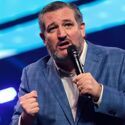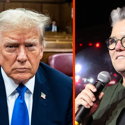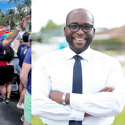
Mark LaFontaine’s Congressional campaign website describes the Floridian as “All American.”
While surely part of a larger political strategy, the patriotic adjective definitely fits the politico’s past. And that past, in many ways, can be read as a distinctly American story: born in Chicago, handed over to a Catholic foster home, taken in by a loving couple with three other children, adopted by said family, summers spent as a Boy Scout, a stint in the Coast Guard before becoming an accountant. Yes, there’s a certain mythology in all of that.
Of course there’s there’s more to the story. Military dreams dashed by harassment, anti-gay witch hunting, discrimination, HIV/AIDS. These aren’t your typical American tales, but, as some know all too well, these elements are equally ingrained in the American fabric. Well, not equally, but you know what we mean…
Fiercely in love with his country, LaFontaine’s currently running for a spot in Florida’s state House, an area that includes Wilton Manors, Pompano Beach and North Lauderdale. Always intrigued by the homo-politicos, our editor recently chatted with LaFontaine about fighting for equally rights in the Boy Scouts, his less-than-ideal outing and why the hell he’s running in the first place. Oh, and LaFontaine’s communications director makes a few cameos. Why? Two words: Charlie Crist.
Read all about it – after the jump…
Andrew Belonsky: Why are you going into politics? What’s your motivation?
Mark LaFontaine: I’ve been a civic activist for over fifteen years and I’ve worked within the community on the outside influencing legislation as a grass-roots activist, so now I believe is a good time for us to actually have a voice in Tallahassee and be able to have a decision maker in the state house on issues that aeffect the community. So, that’s the primary reason why.
AB: When you say “I want to have us” up in the State House, which community are you talking about?
ML: I’m saying the community in general. This district that I’m running for is very diverse. We have gay, lesbian, bisexual, transgender people; we have a large African-American community here, we have a rather large Hispanic community, as well, and because of all the diversity, we need people representing this diverse community up in Tallahassee. Now, Florida has never had an openly gay state legislator, so it is extremely important, I believe, that the legislature be comprised of the broad demographic it represents. And I don’t feel that at this time it does.
AB: Going back to your beginnings, you were born in Chicago, you were taken in as a foster child and the LaFontaine’s later adopted you. Were you ever intrigued to find your biological parents?
ML: Um, as a child, I think everybody who’s adopted has that curiosity, but I never pursued it.
AB: Growing up Catholic, you came from a Catholic foster agency – how important was religion to you growing up? And, also, now?
ML: I would say that spirituality is the most important aspect. I was very lucky, because my mother exposed me to religious denominations of all kinds, because we had friends who were Methodist, Jewish, Episcopalian – the whole gamut, so she was very good at introducing us to these different religious affiliations and letting us see the differences and the similiarities. I consider myself to be much more spiritual, rather than following a specific religion, but I am Catholic by denomination.
AB: Religion plays an important role in American politics – it always has and it probably always will. One of the things that politicians are asked, as I just asked you, is whether or not they’re religious, or believe in God – things like that. Do you believe a politician could get elected if they said they weren’t spiritual or didn’t believe in God?
ML: I do. I do. I think that the issues are of paramount importance to communities today – especially with our economy in recession, particularly Florida. Our state economy is in crisis right now. People want leadership on the issues. They want people who are not going to inject their religious viewpoints into lawmaking decisions, and that’s the perspective that I offer.


AB: Why did you join the Boy Scouts when you became a kid? I understand you became an Eagle Scout very early; you were very dedicated…
ML: I joined scouting – my brother was in Boy Scouts, and both of my sisters were active in Girl Scouts, so scouting was an integral part of our upbringing. I found scouting later in life to be my outlet, and when I say “later in life,” I’m talking about as a young teenager. I had a pronounced lisp, so I was picked on in school, so that was my sanctuary, basically. I felt that I belonged there, it was a comrarderie, a brotherhood; it was somewhere where I felt that I could focus my energies and feel a part of group.
AB: How old were you when you came out?
ML: Actually, I didn’t come out. I was forced out, in the military.
AB: And what happened there?
ML: I was witch hunted.
AB: Was it a retaliatory sort of situation or did you get caught up in a lavender scare?
ML: It was prior to Don’t Ask, Don’t Tell, in 1987. Basically the rationale was that because I wasn’t having sex with women, the question came up.
AB: And that was encouraged – to have sex with women and boast about it?
ML: Pretty much. “The good ol’ boy.”
AB: Was religion a factor in staying in the closet?
ML: Um. I would say it was probably one of the factors.
AB: And what were the others?
ML: Peer pressure. You want to fit in – wanting a sense of belonging.
AB: When did you know that gay people existed?
ML: I mean, I’ve always known I was gay.
AB: Every gay person feels that difference, but there’s always a time when you realize what that difference in fact is…
ML: In high school. When did I know that I was gay would be around middle school. And when did I know that there were other gay people out there or know some? High school, but everybody was closeted back then.
AB: After high school, you were nominated by Republican Representative E. Clay Shaw to go to the Merchant Marine Academy. I don’t know his politics at the time, but he later came out against gay politics and was a Republican stalwart – was there any cognitive dissonance in your mind?
ML: I’ll be honest, I’d never been a fan of his. When you’re graduating high school and you’re looking for opportunities for college and that was one of my opportunities and since I was an Eagle Scout and had been brought up through the ranks of Boy Scouts, it felt like a natural progression for me to enter into the military. I’ve never agreed with his political ideology.
Communications Director Stephen Gaskill: Hey, Andrew, I’m sorry to interrupt. I just wanted to say that in the context of the times, Clay Shaw was, until he was defeated in 2006, extremely popular and pretty well-known. He’s pretty much a fixture here in Florida politics, so even at the time that Mark was applying, fifteen years ago, he was – I don’t want to say “an icon,” but really almost was South Florida politics.
AB: Okay, well, thank you for that. Mark, back to being forced out, how did you family take it?
ML: I didn’t come out to my parents until a year after I was outed. I was witch hunted in July of ’87, I was not officially discharged until December 24th and I did not even tell my parents until August of the following year.
AB: After you told them the truth, was it chill or not a cool scene?
ML: It was not good, no. I had received a Congressional appointment for the Merchant Marine Academy and I ended up leaving the Academy because of harassment and then I went into the Coast Guard figuring that if I went in as a non-rate, I’d be under the radar. You have to understand that I was still living with the burden of having to leave the Academy which is, for all intents and purpose, giving up a four-year scholarship. So, I came back home and they were disappointed already, and the Coast Guard just kind of compounded the situation.
AB: Right. And what about now?
ML: Now is much better. My parents have had a long learning curve. My brother and my sisters is a much different story. We’ve always been very close growing up, so they were very concerned and have always been supportive. My parents are just from a different generation, so it has taken them a lot longer, but they’re extremely supportive now and we’ve never had a better relationship.

AB: What spurred you to become an activist?
ML: Well, the advocacy work started while I was in college. I came back Stateside from the military about a year and half after I was out of the service and I ended up coming back and trying to figure out – you know, you work on getting acclimated to civil life after you’ve been in the military and it is a totally different structure. I was trying to find myself and during that time, in ’92, I ended up finding out that I was HIV positive. That really I believe was the focal turning point in my life because I started seeing what was going on around me with relation to HIV and AIDS within the community, a lot of friends were dying, I lost my best friend in 1994. It shook me. I saw the way that people were being treated – we had paramedics who came to my friend’s home to take him to the hospital, and they wouldn’t even touch him. That just floored me! I was like, “How can people treat each other this way?” That really got me started into a small activist role, because I started volunteering for local HIV and AIDS organizations.
AB: I see.
ML: I then went to work for Veterans Affairs. I ended up having an Equal Employment Opportunity Commission complaint filed against the VA for discrimination in violation of the The Americans with Disabilities Act.. They fired me because I was HIV positive. I saw that there was a need at the local clinic for representation for the employees, so I worked to get the Federal Employees Union up to this clinic and that really was my first real proactive measure in relation to activism. And that just spurred me on, because when I went to college, I became a little more vocal about what it was like to have HIV, the different medications and treatments. Subsequent to that, the Boy Scout issue reared its head in 2000 with the Supreme Court decision. At the time I was volunteering for my nephew’s troop and they went to my sister and told her they didn’t want me to volunteer anymore. I had never mentioned my sexual orientation. It was never an issue. But I then started hearing from people in the area whose children had been asked to leave simply because they acted effeminately or because of the perception of being gay or because they came out as a teenager. And that made me upset and I said, “This has got to stop.” That’s what made me really focus on the issue, I didn’t like seeing a youth organization discriminating against the youth that they were supposed to be serving.
AB: I read an article a few weeks ago about the impact that Mark Foley has had in Florida. People are still shaky on the Republicans down there, and with Bob Allen’s scandal, as well, and these emotions may give the Democrats a big push. Do you agree with that – the psychological impact the Foley scandal?
ML: You know, my understanding from living in the state my whole life, with the exception of being in the service, is that people want elected officials to be open and honest. That is the primary issue that people had and have had with politicians and elected officials. I don’t think the theme of whether they’re gay or not is the issue. It’s whether they’re open and honest. If they’re not open and honest about their personal lives, chances are they’re not going to be open and honest when they’re legislating. I think that’s what resonates more with the community – both Democrats and Republicans alike want to know that there is transparency there and honesty and integrity.
AB: Finally, Charlie Crist. What do you make of all these gay rumors? Are they rooted in fact?
ML: You know, I think people need to live their lives in the best way that they know. I think that someone’s sexuality is their own business, but, again – it’s up to the individual to decide – I’m sorry, it’s up to the individual to be open and honest about their sexual orientation, but it is a private issue. But, again, the public just wants people to be open and honest with them.
SG: Let me – that is not Mark implying that Charlie Crist is gay.
ML: No, I’m not implying anything, I’m just saying that the rumors are always flying out there if you’re a single adult male and you’re over, say, 35 and you’re not married. I have a lot of clients as an accountant that are single individuals and I don’t speculate as to whether they’re gay or not. Like I said, coming out is a very personal and private decision and whether you’re straight or gay – I think that if Charlie Crist has something to say, then he will say it in his own time whether or not he is or isn’t.
SG: And that is not Mark implying that Charlie Crist is gay.
AB: I will be sure to include that in the transcript.


















DK
I like your choice of Boy Scout pictures. The BSA always reminded me of the Hitlerjugend with all their rules, regulations, and intolerance.
John
He’s running for the state legislature, not Congress. There definitely aren’t 92 Congressional districts in Florida.
nuir
hohoo, I am not that surprised at all. I saw herprofile on the black datings site
ukblackfriends.com last week. It said she is interested in seeking a black hottie
for relationship on that site!